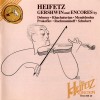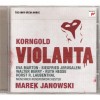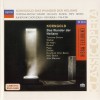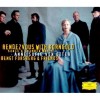Composers
Erich Wolfgang Korngold
| Country: | Austria, United States Of America |
| Period: | XX age |
Erich Wolfgang Korngold (May 29, 1897 – November 29, 1957) was an Austro-Hungarian film and romantic music composer. While his compositional style was considered well out of vogue at the time he died, his music has more recently undergone a reevaluation and a gradual reawakening of interest. Along with such composers as Max Steiner and Alfred Newman, he is considered one of the founders of film music.
Korngold won the Academy Award for his score to The Adventures of Robin Hood in 1938, widely considered one of the greatest scores ever written. His score to Anthony Adverse (1936) also won the Oscar; however, at this time, the Oscar was awarded to the head of the music department of the studio which produced the movie, not the composer him/herself (coincidentally, the year Korngold won for The Adventures of Robin Hood was the first in which the composer, and not the studio music department head, was awarded the Oscar).
Born in a Jewish home in Brünn (Brno) (Austria–Hungary, now Czech Republic), Erich was the second son of eminent music critic Julius Korngold. A child prodigy, Erich played his cantata Gold to Gustav Mahler in 1906; Mahler called him a "musical genius" and recommended study with composer Alexander von Zemlinsky. Richard Strauss also spoke very highly of the youth. At the age of 11 he composed his ballet Der Schneemann (The Snowman), which became a sensation when performed at the Vienna Court Opera in 1910, including a command performance for Emperor Franz Josef. This work was followed first with a piano trio, then his Piano Sonata No. 2 in E major that Artur Schnabel played throughout Europe. During his early years Korngold also made live-recording player piano music rolls for the Aeolian Duo-Art system, all of which survive today and can be heard.
Korngold wrote his first orchestral score, the Schauspiel Ouverture when he was 14. His Sinfonietta appeared the following year, and his first two operas, Der Ring des Polykrates and Violanta, in 1914. He completed his opera Die tote Stadt, which became an international success, in 1920 at the age of 23. At this point Korngold had reached the zenith of his fame as a composer of opera and concert music. Composers such as Richard Strauss and Giacomo Puccini heaped praise on him, and many famous conductors, soloists and singers added his works to their repertoires. He completed a Concerto for Piano Left Hand for pianist Paul Wittgenstein in 1923 and his fourth opera, Das Wunder der Heliane four years later. He also started arranging and conducting operettas by Johann Strauss II and others while teaching opera and composition at the Vienna Staatsakademie. Korngold was awarded the title professor honoris causa by the president of Austria.
Max Reinhardt, with whom Korngold had collaborated on the operas Die Fledermaus and La belle Helene, asked the composer to come to Hollywood in 1934 to adapt Felix Mendelssohn's incidental music for A Midsummer Night's Dream to his film version of the play. Over the next four years, he became a pioneer in composing film scores that have been recognized ever since as classics of their kind. In 1938, Korngold was conducting opera in Austria when he was asked by Warner Brothers to come back to Hollywood and compose a score for their new (and very expensive) film The Adventures of Robin Hood (1938), starring Errol Flynn. He agreed and returned by ship. Shortly after he arrived in California, the Anschluss took place and the condition of Jews in Austria became very perilous so that he stayed in America. Korngold later would say the film score of The Adventures of Robin Hood saved his life. He won the Academy Award for Best Original Score for the film, and was later nominated for The Private Lives of Elizabeth and Essex (1939) and The Sea Hawk (1940). A Korngold authority wrote:
Treating each film as an 'opera without singing' (each character has his or her own leitmotif) [Korngold] created intensely romantic, richly melodic and contrapuntally intricate scores, the best of which are a cinematic paradigm for the tone poems of Richard Strauss and Franz Liszt. He intended that, when divorced from the moving image, these scores could stand alone in the concert hall. His style exerted a profound influence on modern film music.
—Brendan G. Carroll, Korngold, Erich Wolfgang
In 1943, Korngold became a naturalized citizen of the United States. The year 1945 became an important turning point in Korngold's life. His father, who had never been entirely comfortable in Los Angeles, and who had never approved of Erich's decision to focus exclusively on film composition, died after a lengthy illness. Roughly around the same time, the war in Europe drew to an end. Korngold himself had grown increasingly disillusioned with Hollywood and with the kinds of pictures he was being given, and he was eager to return to writing music for the concert hall and the stage. Korngold stopped writing original film scores after 1946. His final score at Warner Bros. was Deception starring Bette Davis, Paul Henreid, and Claude Rains. However, he was asked by Republic Pictures to adapt the music of Richard Wagner for a film biography of the composer, released in Trucolor, as Magic Fire (1955), directed by William Dieterle from a script by Ewald Andre Dupont. Korngold also wrote some original music for the film and had an unbilled cameo as the conductor Hans Richter.
After World War II Korngold continued to write concert music in a rich, chromatic late Romantic style, with the Violin Concerto among his notable later works. Korngold died in North Hollywood on November 29, 1957 and was buried at Hollywood Forever Cemetery.
Despite his achievements and considerable popularity with the musical public, Korngold for years attracted almost no positive critical attention, but considerable critical disdain. Then, in 1972, RCA Victor released an LP titled The Sea Hawk, featuring excerpts from Korngold's film scores performed by the National Philharmonic Orchestra, conducted by Charles Gerhardt and supervised by the composer's son George. (This album and other classic film scores by Hollywood composers were later issued by RCA on CD in Dolby Surround Sound.) This was followed by recordings of Korngold's operas and concert works, which led to performances of his symphony and concertos, as well as other compositions.
In 1973, Warner Brothers released special LPs featuring excerpts from the original soundtracks of films scored by Korngold, which had actually been conducted by Warner's music director Leo Forbstein, as a well as a rare recording of Korngold playing the main theme from Kings Row on the piano. In addition, a KFWB radio broadcast from 1938 with Korngold conducting the studio orchestra in excerpts from The Adventures of Robin Hood, narrated by actor Basil Rathbone, was released on LP. In 1975 Die tote Stadt was revived to capacity houses in New York.
There have also been a number of new digital recordings of Korngold's film scores, as well as some of his concert works, especially his violin concerto and his symphony. RCA Victor was the first to record a complete Korngold opera (in stereo), Die tote Stadt, conducted by Erich Leinsdorf in Germany. In 1980, CBS Masterworks recorded the opera Violanta under the baton of Marek Janowski; this recording has been re-released by Sony Classical in 2009. In 1993 Decca released a recording of Das Wunder der Heliane conducted by John Mauceri in their Entartete Musik series. Korngold's two remaining operas, Der Ring des Polykrates and Die Kathrin have both been recorded (in 1996 and 1998 respectively) by the German record label CPO. This company also released four CDs with orchestral works with Werner Andreas Albert conducting the Nordwestdeutsche Philharmonie. The American conductor-pianist Alexander Frey has recorded a CD with piano works for Koch International Classics. The English pianist Martin Jones recorded the complete piano music on four CDs for Nimbus Records. In 2001 ArtHaus Musik released a documentary DVD Erich Wolfgang Korngold - The Adventures of a Wunderkind. Noted double bass soloist Joel Quarrington recorded a transcription of the "Garden Scene" from Korngold's incidental music to "Much Ado About Nothing," Op. 11 on his 2008 CD, also titled "Garden Scene." Quarrington won a Juno Award for the album. In 2009, Korngold's Violin Concerto was released on the Naxos Records label, along with Overture to a Drama, Op. 4, and the concert suite from Much Ado About Nothing, performed by the Orquesta Sinfonica de Mineria and violinist Philippe Quint.
Further recognition came in the 1990s; two full-scale biographies of him appeared almost simultaneously. One is Jessica Duchen, Erich Wolfgang Korngold (Phaidon Press, 20th Century Composers series, 1996). The other is Brendan G. Carroll, Erich Korngold: The Last Prodigy (Amadeus Press, 1997). Carroll is President of the International Korngold Society. Carroll has released excerpts of acetates with Korngold conducting the Warner Brothers studio orchestra in music from his film scores, possibly taken from KFWB radio broadcasts. On British television, in the 1970s, Andre Previn conducted one movement from the violin concerto, and then told the story of the 'famous' American music critic who declared that "Korngold's violin concerto is more corn than gold". Previn then pointed out that the critic is no longer remembered whereas Korngold is.
The American Film Institute ranked Korngold's score for The Adventures of Robin Hood #11 on their list of the greatest film scores. His scores for the following films were also nominated for the list:
Deception (1946)
Kings Row (1942)
The Private Lives of Elizabeth and Essex (1939)
The Sea Hawk (1940)
Recently Added
| Country: | Austria, United States Of America |
| Period: | XX age |
Biography
Erich Wolfgang Korngold (May 29, 1897 – November 29, 1957) was an Austro-Hungarian film and romantic music composer. While his compositional style was considered well out of vogue at the time he died, his music has more recently undergone a reevaluation and a gradual reawakening of interest. Along with such composers as Max Steiner and Alfred Newman, he is considered one of the founders of film music.
Korngold won the Academy Award for his score to The Adventures of Robin Hood in 1938, widely considered one of the greatest scores ever written. His score to Anthony Adverse (1936) also won the Oscar; however, at this time, the Oscar was awarded to the head of the music department of the studio which produced the movie, not the composer him/herself (coincidentally, the year Korngold won for The Adventures of Robin Hood was the first in which the composer, and not the studio music department head, was awarded the Oscar).
Born in a Jewish home in Brünn (Brno) (Austria–Hungary, now Czech Republic), Erich was the second son of eminent music critic Julius Korngold. A child prodigy, Erich played his cantata Gold to Gustav Mahler in 1906; Mahler called him a "musical genius" and recommended study with composer Alexander von Zemlinsky. Richard Strauss also spoke very highly of the youth. At the age of 11 he composed his ballet Der Schneemann (The Snowman), which became a sensation when performed at the Vienna Court Opera in 1910, including a command performance for Emperor Franz Josef. This work was followed first with a piano trio, then his Piano Sonata No. 2 in E major that Artur Schnabel played throughout Europe. During his early years Korngold also made live-recording player piano music rolls for the Aeolian Duo-Art system, all of which survive today and can be heard.
Korngold wrote his first orchestral score, the Schauspiel Ouverture when he was 14. His Sinfonietta appeared the following year, and his first two operas, Der Ring des Polykrates and Violanta, in 1914. He completed his opera Die tote Stadt, which became an international success, in 1920 at the age of 23. At this point Korngold had reached the zenith of his fame as a composer of opera and concert music. Composers such as Richard Strauss and Giacomo Puccini heaped praise on him, and many famous conductors, soloists and singers added his works to their repertoires. He completed a Concerto for Piano Left Hand for pianist Paul Wittgenstein in 1923 and his fourth opera, Das Wunder der Heliane four years later. He also started arranging and conducting operettas by Johann Strauss II and others while teaching opera and composition at the Vienna Staatsakademie. Korngold was awarded the title professor honoris causa by the president of Austria.
Max Reinhardt, with whom Korngold had collaborated on the operas Die Fledermaus and La belle Helene, asked the composer to come to Hollywood in 1934 to adapt Felix Mendelssohn's incidental music for A Midsummer Night's Dream to his film version of the play. Over the next four years, he became a pioneer in composing film scores that have been recognized ever since as classics of their kind. In 1938, Korngold was conducting opera in Austria when he was asked by Warner Brothers to come back to Hollywood and compose a score for their new (and very expensive) film The Adventures of Robin Hood (1938), starring Errol Flynn. He agreed and returned by ship. Shortly after he arrived in California, the Anschluss took place and the condition of Jews in Austria became very perilous so that he stayed in America. Korngold later would say the film score of The Adventures of Robin Hood saved his life. He won the Academy Award for Best Original Score for the film, and was later nominated for The Private Lives of Elizabeth and Essex (1939) and The Sea Hawk (1940). A Korngold authority wrote:
Treating each film as an 'opera without singing' (each character has his or her own leitmotif) [Korngold] created intensely romantic, richly melodic and contrapuntally intricate scores, the best of which are a cinematic paradigm for the tone poems of Richard Strauss and Franz Liszt. He intended that, when divorced from the moving image, these scores could stand alone in the concert hall. His style exerted a profound influence on modern film music.
—Brendan G. Carroll, Korngold, Erich Wolfgang
In 1943, Korngold became a naturalized citizen of the United States. The year 1945 became an important turning point in Korngold's life. His father, who had never been entirely comfortable in Los Angeles, and who had never approved of Erich's decision to focus exclusively on film composition, died after a lengthy illness. Roughly around the same time, the war in Europe drew to an end. Korngold himself had grown increasingly disillusioned with Hollywood and with the kinds of pictures he was being given, and he was eager to return to writing music for the concert hall and the stage. Korngold stopped writing original film scores after 1946. His final score at Warner Bros. was Deception starring Bette Davis, Paul Henreid, and Claude Rains. However, he was asked by Republic Pictures to adapt the music of Richard Wagner for a film biography of the composer, released in Trucolor, as Magic Fire (1955), directed by William Dieterle from a script by Ewald Andre Dupont. Korngold also wrote some original music for the film and had an unbilled cameo as the conductor Hans Richter.
After World War II Korngold continued to write concert music in a rich, chromatic late Romantic style, with the Violin Concerto among his notable later works. Korngold died in North Hollywood on November 29, 1957 and was buried at Hollywood Forever Cemetery.
Despite his achievements and considerable popularity with the musical public, Korngold for years attracted almost no positive critical attention, but considerable critical disdain. Then, in 1972, RCA Victor released an LP titled The Sea Hawk, featuring excerpts from Korngold's film scores performed by the National Philharmonic Orchestra, conducted by Charles Gerhardt and supervised by the composer's son George. (This album and other classic film scores by Hollywood composers were later issued by RCA on CD in Dolby Surround Sound.) This was followed by recordings of Korngold's operas and concert works, which led to performances of his symphony and concertos, as well as other compositions.
In 1973, Warner Brothers released special LPs featuring excerpts from the original soundtracks of films scored by Korngold, which had actually been conducted by Warner's music director Leo Forbstein, as a well as a rare recording of Korngold playing the main theme from Kings Row on the piano. In addition, a KFWB radio broadcast from 1938 with Korngold conducting the studio orchestra in excerpts from The Adventures of Robin Hood, narrated by actor Basil Rathbone, was released on LP. In 1975 Die tote Stadt was revived to capacity houses in New York.
There have also been a number of new digital recordings of Korngold's film scores, as well as some of his concert works, especially his violin concerto and his symphony. RCA Victor was the first to record a complete Korngold opera (in stereo), Die tote Stadt, conducted by Erich Leinsdorf in Germany. In 1980, CBS Masterworks recorded the opera Violanta under the baton of Marek Janowski; this recording has been re-released by Sony Classical in 2009. In 1993 Decca released a recording of Das Wunder der Heliane conducted by John Mauceri in their Entartete Musik series. Korngold's two remaining operas, Der Ring des Polykrates and Die Kathrin have both been recorded (in 1996 and 1998 respectively) by the German record label CPO. This company also released four CDs with orchestral works with Werner Andreas Albert conducting the Nordwestdeutsche Philharmonie. The American conductor-pianist Alexander Frey has recorded a CD with piano works for Koch International Classics. The English pianist Martin Jones recorded the complete piano music on four CDs for Nimbus Records. In 2001 ArtHaus Musik released a documentary DVD Erich Wolfgang Korngold - The Adventures of a Wunderkind. Noted double bass soloist Joel Quarrington recorded a transcription of the "Garden Scene" from Korngold's incidental music to "Much Ado About Nothing," Op. 11 on his 2008 CD, also titled "Garden Scene." Quarrington won a Juno Award for the album. In 2009, Korngold's Violin Concerto was released on the Naxos Records label, along with Overture to a Drama, Op. 4, and the concert suite from Much Ado About Nothing, performed by the Orquesta Sinfonica de Mineria and violinist Philippe Quint.
Further recognition came in the 1990s; two full-scale biographies of him appeared almost simultaneously. One is Jessica Duchen, Erich Wolfgang Korngold (Phaidon Press, 20th Century Composers series, 1996). The other is Brendan G. Carroll, Erich Korngold: The Last Prodigy (Amadeus Press, 1997). Carroll is President of the International Korngold Society. Carroll has released excerpts of acetates with Korngold conducting the Warner Brothers studio orchestra in music from his film scores, possibly taken from KFWB radio broadcasts. On British television, in the 1970s, Andre Previn conducted one movement from the violin concerto, and then told the story of the 'famous' American music critic who declared that "Korngold's violin concerto is more corn than gold". Previn then pointed out that the critic is no longer remembered whereas Korngold is.
The American Film Institute ranked Korngold's score for The Adventures of Robin Hood #11 on their list of the greatest film scores. His scores for the following films were also nominated for the list:
Deception (1946)
Kings Row (1942)
The Private Lives of Elizabeth and Essex (1939)
The Sea Hawk (1940)


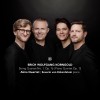
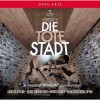

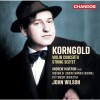

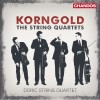
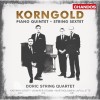
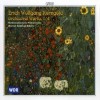
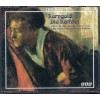
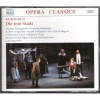
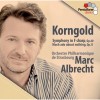


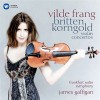
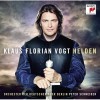
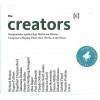
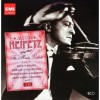
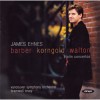

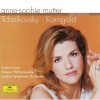
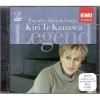
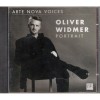
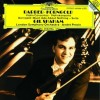
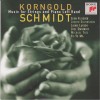
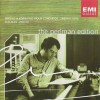
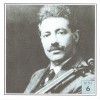
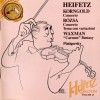
![The Heifetz Collection, Volume 2 [3 CD]](http://static.classicalm.com/repository/disk-cover/small/717-img1315129517717299.jpg)
![The Heifetz Collection, Volume 6 [2 CD]](http://static.classicalm.com/repository/disk-cover/small/725-img1315427995644122.jpg)
